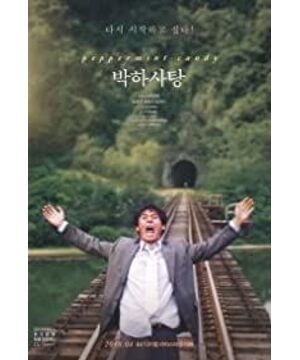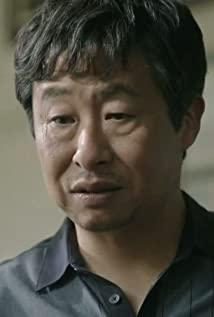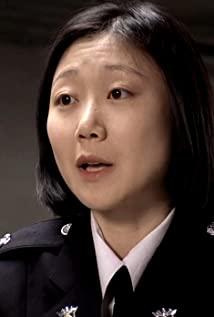The Korean film "Peppermint Candy" (Peppermint Candy) is a film about time, about how time can destroy a person's life. Director Li Cangdong is good at using beautiful pictures to depict the living conditions of small people or marginal characters. Whether it is in "Oasis" or "Mints", there are deep personal traces in it. In "Mints", he allowed time to destroy the life of an ordinary person. The movie is based on 1999, 1994, 1987, 1984, 1980, and finally 1979.
It is not an exaggeration to say that "Mints" outlines the social changes in South Korea in the past 20 years. Especially in the Gwangju incident, this is worth thinking about, and it is also Lee Cangdong's outstanding point. Compared with Chinese scar literature, Korea does not have so much historical material. Of course, the Gwangju incident was a complete tragedy. Therefore, the Koreans celebrated their victory in the 2002 World Cup, and the home stadium of Gwangju became a red ocean. The domestic media did not forget to light the candles of the past when they were doing programs, and pointed out that the young people of South Korea had long forgotten the history of 20 years ago. I don't know the hardships Gwangju has suffered, and a nation that doesn't know how to reflect is not a nation that is truly admirable. The veiled words are satirizing the outstanding performance of the Koreans in the World Cup.
At that time, there was some fortunate psychology. It seems that our reflection works are endless and common. In fact, no one touches the real restricted area. When he encountered the Gwangju incident when he did not serve in the military, he killed the innocent girl by mistake. Kim Yong-ho's future life can reduce some guilt, but the mints that have been trampled on are scattered all over the place. It was this period of life as a soldier and the various experiences in the barracks that aroused the violence and crimes in the depths of Yong Hao's human nature, and made him unable to extricate himself because of his indulgence.
Yonghao's once pure soul was corroded by the blow of the Gwangju incident, but his temperament had the only remaining kindness, so he turned down his first girlfriend by accident. If his kindness can finally disappear, then he is also a complete tragedy. But what is worrying is that he can't forget this relationship, and loses time and time again in the resignation: cruelty to the prisoner, irresponsibility to his wife, no concern for the family, hatred for himself. So when his business went bankrupt and his wife divorced, he inevitably embarked on the road of destruction, and all of this was dragged by the invisible hand step by step.
A life that was once young and kind has just gone that way. To attribute the destruction of individuals to intangible history is actually a pretentious exaggeration, but the influential role of history in guiding individuals or infringing on lives is beyond doubt. If there were no Gwangju incident, Yonghao would not be worth cherishing as a victim of self-destruction. At best, he was a typical self-rejection, but it was precisely because of the mistaken killing of an innocent life as a soldier, the guilt and the violent fire that was ignited in the future, It was the root cause of his final demise.
Being irritable and capricious are both sinful aspects of his nature. Peppermint is just a refreshing moment, and it doesn't keep the breath fresh. No matter how beautiful the first love is, it is only a lonely memory in exchange. For a vacillating character like Yong Hao, "Mints" is quite in-depth. Yonghao didn't intentionally hurt Shunren, but because he loved her too much and couldn't hurt him. This remaining goodwill directly made it difficult for him to survive. He chose a new relationship, but betrayed his heart. He did not want to touch the wounds of the past and hurt his current family.
In addition to the topic, I have to express how little personal power is before history. When a person cannot resist the influence of the environment of the times, he can only be assimilated because he has already been infected. Yonghao's sorrow is even more that this is a kind of self-destruction, and the surrounding influence is only a cause. As for the actual reason, it is probably the defect of his own personality. The tiled stories and straightforward flashbacks make the story somewhat dull. And the story has to be edited backwards in my mind, and I watched it several times before reading it all at once. Compared with the abnormal love in Li Cangdong's later work "Oasis", the group mourning that "Mint" can trigger is much easier to accept. Twenty years of change, for an ordinary citizen, enlisting in the army, being a police officer, getting married, starting a business, going bankrupt, or committing suicide, is not a marginal state of individual survival, but a group's memory of the times.
On an outing in 1979, Yong Hao left his friends, looked at the sky quietly, and shed tears. Does this deliberate trace tell us the origin of his pain in the next 20 years? Faced with the same blue sky, Yong Hao couldn't resist the glare of the sun. Such glare is like a scar that cannot be smoothed deep in my heart.
Before that, Yonghao’s friends were sitting around a bunch of people, playing guitar and singing. The lyrics were like this:
What should I
do, you can’t leave me alone , really can’t, please don’t leave me, what can’t you do? Tell me about my difficulties, you
who were so kind, and you who were so gentle, how can you be so ruthless and
unbelievable, you will leave
me and I don't believe it, you say goodbye to me
in the song, who abandoned whom? Parting of young people. Who is short or long with endless sighs and endless love? Time has abandoned them. If time goes back a few years or starts early, no one should leave. The gentle words are actually false hallucinations. Perhaps the most real thing is just the touch once, like the coolness of the mint entrance. Looking at these affectionate lyrics, I always think of Yong Hao snuggling with the woman who happened to be in the small hotel on that rainy night.
He said: He was watching the falling rain outside the window, and her beloved was watching; Shun Ren was listening to the ticking sound of the rain. After several persuasion, Yong Hao suddenly felt that the people around him were obedient, so he called his lover's name tremblingly, and wept bitterly, tears streaming down his voice. The woman beside her also burst into tears. Outside the window, there is still sleepless night rain. It's pattering.
View more about Peppermint Candy reviews











